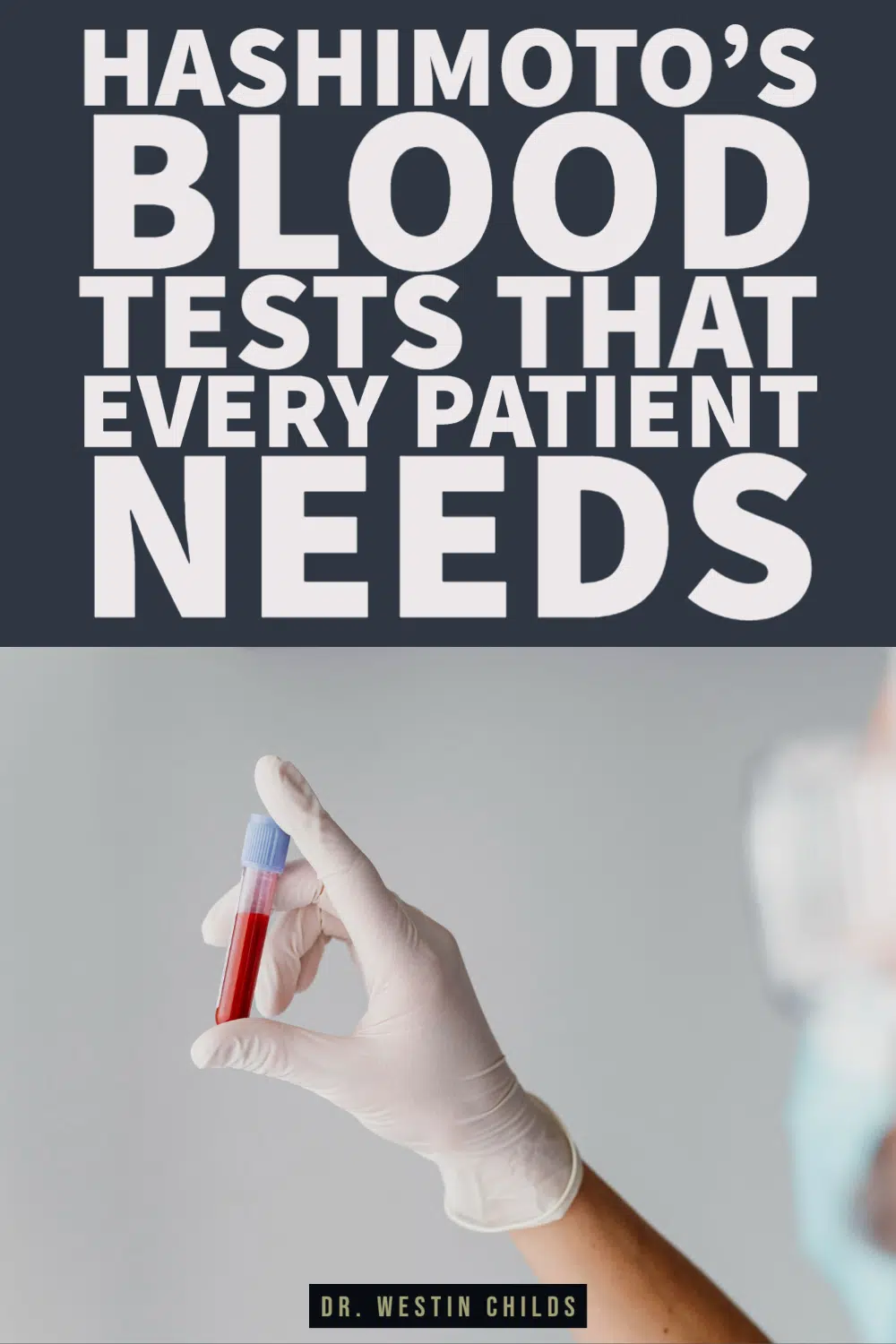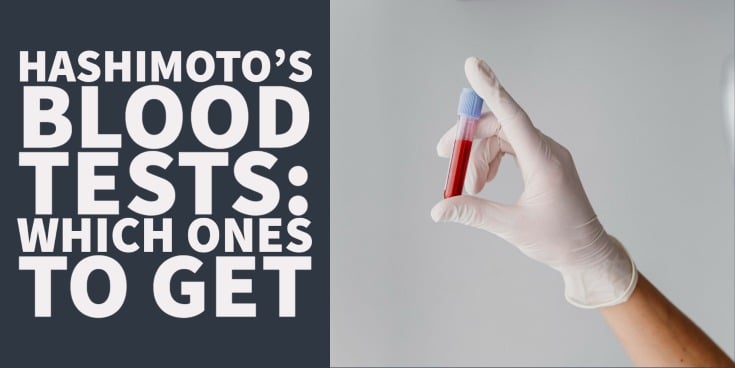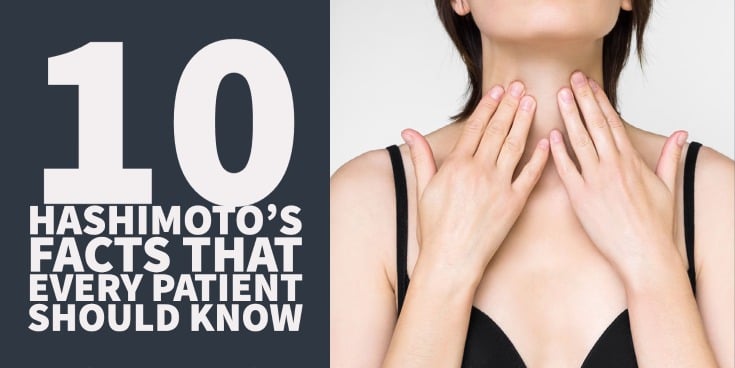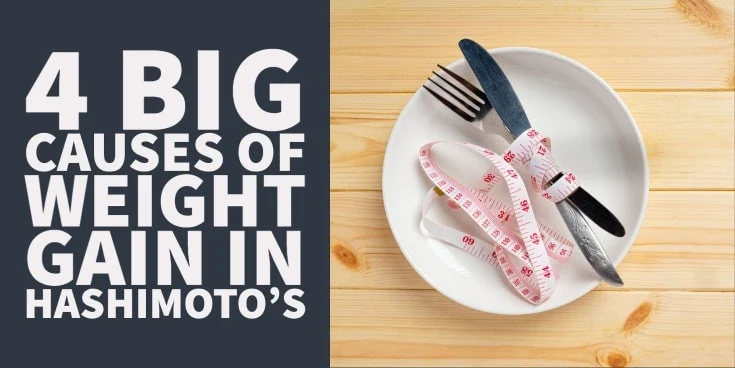Hashimoto’s is the #1 cause of hypothyroidism in the United States.
This means that there is a huge chance that you have Hashimoto’s thyroiditis if you have low thyroid function to any degree.
And, believe it or not, the fact that Hashimoto’s is so common does not mean that it is diagnosed very often.
Most people who have it don’t know that they do!
But let’s put that aside for a moment…
One of the bigger issues surrounding Hashimoto’s is the fact that most doctors don’t care about making the diagnosis.
This might sound crazy at first but let me explain.
Your doctor is really only thinking about thyroid management in terms of whether or not you need thyroid medication.
He/she doesn’t care WHY you have thyroid problems they only care if you need thyroid medication.
And this mindset leads them to pretty much ignore Hashimoto’s as a diagnosis because they don’t consider it ‘treatable’ nor do they care about the disease until it impacts your thyroid enough to warrant the use of thyroid medication.
This may sound unsettling to you as a patient and it should be.
The good news is that you can do something about it (treatment-wise) AND you can order more tests than you think in order to find out the extent of the damage and to help direct treatment/therapies.
This article will walk you through the exact lab tests that I order on all patients with Hashimoto’s thyroiditis and give you some insight as to what these labs tell you.
Let’s jump in:
DOWNLOAD FREE RESOURCES
Foods to Avoid if you Have Thyroid Problems:
I’ve found that these 10 foods cause the most problems for thyroid patients. Learn which foods you should avoid if you have thyroid disease of any type.
The Complete List of Thyroid Lab tests:
The list includes optimal ranges, normal ranges, and the complete list of tests you need to diagnose and manage thyroid disease correctly!
If you have Hashimoto’s (or think you might) Get THESE Lab Tests
If it isn’t already clear, you want to get ALL of these tests if you have a KNOWN diagnosis of Hashimoto’s and even if you just have regular hypothyroidism.
The reason is that many patients with hypothyroidism have Hashimoto’s without even realizing it.
And one of the good things about a diagnosis of Hashimoto’s is knowing you have it because the treatment is different from that of regular hypothyroidism.
Treating Hashimoto’s focuses both on managing thyroid function and on managing your immune system.
#1. Anti-TPO Antibodies
The first test that you should be aware of is something called anti-TPO antibody.
Anti-TPO stands for anti-thyroid peroxidase and these are antibodies that are created by your immune system that target a special enzyme found in your thyroid gland.
Honestly, what you really need to know is that the presence of these antibodies in your bloodstream indicates that your immune system is not functioning properly and are highly suggestive that you have an autoimmune disease.
The higher the antibodies in your blood the worse the condition (this isn’t always true but you can use it as a basic guideline).
So, if you have Hashimoto’s thyroiditis, you should be aware of not only this lab test but also your own personal VALUE.
When you get your TPO antibodies tested you will get a number.
You can track this number and use it as a proxy to determine if you are doing the right treatments.
As you do the right treatments you should see it go down.
Just for completeness’ sake, you should also be aware that not all cases of elevated TPO antibodies necessarily indicate Hashimoto’s thyroiditis.
You should also be aware that antibodies do not always track with your disease state.
These are general rules but they don’t hold true for 100% of people (just be aware of this but don’t let it confuse you).
#2. Thyroglobulin Antibodies
Thyroglobulin antibodies are another hallmark of Hashimoto’s disease and you can consider them very similar (but different) to TPO antibodies.
Thyroglobulin is a protein found in the thyroid gland that is important for creating and releasing thyroid hormone.
You should never see these antibodies in a normal healthy condition (1) because the thyroid gland is relatively protected from other areas of your body.
So the presence of these antibodies indicates thyroid inflammation and damage which has allowed your immune system to ‘see’ these proteins.
You should order BOTH thyroglobulin antibodies and anti-TPO antibodies if you have Hashimoto’s and you should track them both.
You will find that these antibodies rise and fall with your thyroid status and immune status.
As you improve your immune function you should see these antibody levels fall (much like anti-TPO antibodies).
You should also be aware that there is a connection between elevated thyroglobulin antibodies and the development of thyroid cancer (2) (another reason to get your antibodies down!).
#3. ESR
ESR is a really quick and easy way to assess the level of inflammation in your body.
ESR stands for erythrocyte sedimentation rate and it is a way to test how ‘sticky’ your red blood cells are.
The higher the ESR the more systemic inflammation there is in your body.
The more inflammation in your body the worse your immune system is doing which should be a sign that you need to target and lower that inflammation as soon as possible.

ESR should always be paired with CRP (more below) but you should be aware that these tests only assess for systemic inflammation.
Systemic inflammation is different from low-grade inflammation as low-grade inflammation may not be picked up by these lab tests.
But understanding if you have inflammation in your body is VERY important if you have Hashimoto’s due to the nature of this disease being immune-mediated.
#4. CRP
CRP stands for C reactive protein and it is another way to measure systemic inflammation in your body.
There are a couple of versions of CRP including the HS-CRP (high sensitivity CRP) and the standard CRP.
The HS-CRP is typically used to test for very low levels of inflammation and used to give you an idea about your risk of heart disease (3).
You can really use either as a patient with Hashimoto’s but you should understand the difference.
You should also realize that you can STILL have inflammation even if both the CRP and the ESR are negative or not technically “elevated”.
Many patients with Hashimoto’s have isolated thyroid gland inflammation or systemic low-grade inflammation both of which are not always picked up by ESR and CRP testing but are still very important as they carry the same risks.
Even though these tests aren’t perfect they are still a great cheap and effective way to assess inflammation.
#5. Vitamin D
Vitamin D should be tested if you have Hashimoto’s for several reasons!
The first is because there is a close association between low Vitamin D (vitamin D deficiency) and the development of autoimmune disease.
Meaning if you have low Vitamin D levels you are much more likely to develop Hashimoto’s, in the first place.
Knowing if you have low Vitamin D is obviously important in this setting because increasing your Vitamin D levels if it is low may actually help improve your immune system and therefore TREAT your condition.
There are even studies that show that the degree of Vitamin D deficiency CORRELATES with the number of antibodies in your body (4).
The lower your vitamin D level the higher your antibodies.
But the rabbit hole goes much deeper than this.
There is also a very strong and important connection between Vitamin D and thyroid function more generally.
Such that low levels of Vitamin D also increase your risk for thyroid cancer and Graves’ disease.
The bottom line is that you should be aware of your Vitamin D status if you have Hashimoto’s which means you need to be testing it semi-frequently (2 times per year should do the trick).
And, in case you were wondering, YES you will most likely have to ask your doctor for this test.
Most doctors are not aware of the important connection between Vitamin D and Hashimoto’s which means you NEED to be.
You can increase your Vitamin D level by using liquid Vitamin D3 supplements which work great for thyroid patients.
#6. TSH
Here is where we get into the more general thyroid lab tests which assess thyroid function.
By thyroid function, I am referring to how WELL your thyroid is actually working.
This matters for regular hypothyroidism but also for Hashimoto’s thyroiditis.
The thyroid antibodies present in Hashimoto’s will eventually cause some damage to your thyroid gland (sometimes irreversible, by the way) if they are not treated or kept in check.
So no matter where you are at in your Hashimoto’s journey, you need to be testing thyroid FUNCTION to assess how well your thyroid gland is actually working.
Early Hashimoto’s is generally associated with HIGH levels of thyroid function while late-stage Hashimoto’s is associated with LOW levels of thyroid function.
The LOWER your thyroid function the more likely you are to need thyroid medication to supplement whatever your own thyroid gland cannot produce.
The TSH helps you assess thyroid function (although, somewhat inaccurately) by telling you how well a portion of your hypothalamic-pituitary-thyroid axis is working.
Without getting too complicated, the TSH helps assess pituitary involvement and helps you understand if enough thyroid hormone is being produced.
If you are not producing enough thyroid hormone then your TSH will start to rise.
The higher your TSH goes the LESS your thyroid is working.
This is why when your TSH reaches a certain point your doctor will most likely put you on thyroid medication.
There’s only one problem with the TSH…
It doesn’t work very well as an isolated test for Hashimoto’s patients.
There have been many patients with Hashimoto’s who have a NORMAL TSH but who respond fabulously well to small doses of thyroid hormone.
This indicates that there is a discordance between the TSH and thyroid function in Hashimoto’s patients.
What does this mean for you?
It means you SHOULD test for the TSH but you shouldn’t live and die by its value and assume that it perfectly assesses your thyroid function.
If you still feel very poorly and have the symptoms of hypothyroidism then you may benefit from a trial of thyroid medication.
#7. Free T3
In line with this thinking is the need to test for what is known as your free thyroid hormone levels.
The TSH does NOT give you an accurate picture of these hormones by itself but you can test for them individually.
What do these lab tests tell you?
They tell you how much free thyroid hormone is available for use in your blood.
And in case you were wondering why it matters, consider the case of virtually just about every other hormone in your body.
If you wanted to know how much estrogen is in your body would you test for your estrogen level in the blood or would you test for your LH and FSH levels?
Of course, you would look directly at your estrogen levels.
By the way, LH and FSH are just measures of pituitary function much like the TSH is to your thyroid.
But for whatever reason, doctors have major blinders on when it comes to your thyroid.
They would rather look at your TSH (a measure of pituitary function) instead of your free thyroid hormone levels.
Even though we could argue, and I make this argument frequently, that your free thyroid hormone levels are more important.
Free T3 is especially important because it is a measure of the total amount of ACTIVE thyroid hormone in your blood.
T3 is the single most powerful and potent thyroid hormone in your body and, therefore, the most important to measure.
You may need to ask your doctor specifically for this test and don’t be surprised if you get pushback.
It wouldn’t be recommended, but you could ask your doctor why they only care about the TSH when they frequently order free estrogen and free testosterone levels when testing for menopause or andropause.
OR, you could ask why doctors don’t order FSH or LH when using birth control (or any test for that matter).
OR, you could ask why doctors don’t regularly test for ACTH when using prednisone.
All of these examples contradict the idea that the TSH would be the ‘perfect’ test for your thyroid.
The answer they try to fumble out would be amusing and would explain just how clueless your doctor probably is on the subject 🙂
The bottom line?
Get your free T3 tested because its level is important.
#8. Free T4
In line with free T3 is the free T4.
Even though your T4 isn’t as metabolically active as T3, it’s still important to measure.
The T4 is primarily produced by your thyroid gland so measuring your free T4 level can give you a rough idea as to how well your thyroid gland is functioning and how damaged it has become from your autoimmune disease.
Free T4 is not as important as free T3 but you should measure them together because it gives you information on something called thyroid conversion.
Thyroid conversion is the process whereby your body takes the inactive T4 thyroid hormone and turns it into the metabolically active T3 thyroid hormone.
Inflammation, one of the hallmarks of Hashimoto’s, DECAYS this process and slows it down (5).
If you have this issue then you may see a normal to high free T4 level and a low/low-normal free T3.
#9. Reverse T3
Lastly, you want to get a test called reverse T3.
Reverse T3 is an anti-thyroid metabolite that is formed when your body doesn’t convert T4 into T3.
So high levels of reverse T3 will slow down thyroid function and may lead to hypothyroid symptoms.
Unfortunately, reverse T3 is another test that your doctor may push back on if you request it.
Even if your doctor pushes back you should still get this test because it helps give a complete picture of your thyroid.
There’s just no way that you can look at tests like the TSH and free T4 and consider your thyroid picture to be ‘complete’.
These basic tests don’t tell you how much active free thyroid hormone is present or how well your body is utilizing the conversion process.
And ALL of these tests should be considered “required” when you go in to get your blood drawn.
I could talk all day about the importance of reverse T3 so if you haven’t heard about it make sure that you check out these articles:
- Causes of high reverse T3
- Reverse T3 treatment guide
- How to calculate your free T3:reverse T3 ratio
How to get these tests!
The absolute best place to get these labs is straight from your doctor.
It will require a written prescription to get them drawn but this will ensure that you have the highest chance of insurance covering them.
I’ve mentioned several times that your doctor may give you some pushback on some of the tests listed above.
If that happens do NOT settle for an incomplete set of labs.
Getting an incomplete set of labs is just really not helpful because it doesn’t help you target your therapies/treatments.
Try to get your existing doctor to work with you and ask if they are willing to order these tests.
If they aren’t then you have a couple of choices:
#1. Find a new doctor (recommended).
Or #2. Get the labs drawn yourself (second best option).
You’ll need a good doctor to work with you eventually so you might as well spend the time and energy to find one.
But, you don’t necessarily have to wait for a new doctor in order to get your labs drawn.
There are a handful of places where you can get your labs drawn without a doctor’s prescription.
The only downside to these places is that they aren’t covered by insurance which means you will need to pay cash (which can get pricey).
Final Thoughts
These labs are pretty much what I would consider to be the basics for ANYONE with suspected Hashimoto’s or known Hashimoto’s.
I would strongly encourage you to get these labs even if you’ve had a known diagnosis of Hashimoto’s for many years.
On the other hand, you will also want to get these labs even if you have regular hypothyroidism.
I pretty much get this basic set of labs on EVERY thyroid patient because the information is always helpful.
Now I want to hear from you:
Have you had this complete Hashimoto’s lab panel done before?
If so, what did your lab tests tell you?
If not, are you planning on getting this panel?
Do you have a doctor who you think will order them for you?
Leave your answers, comments, or questions below!








